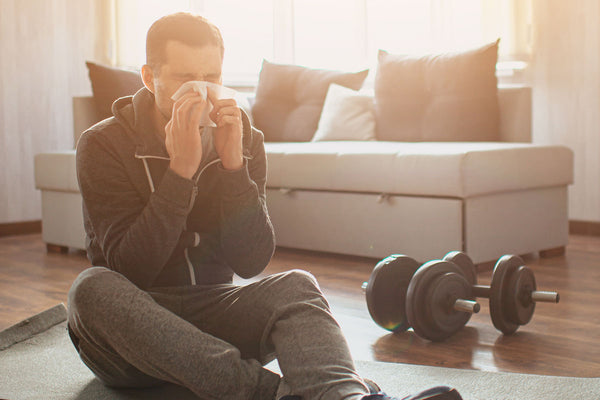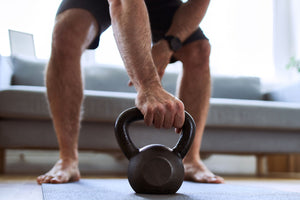The common cold is a regular occurrence, with the average adult experiencing 2-4 colds annually. Colds are usually caused by viruses that lead to inflammation in the nose and throat. This
While they’re usually harmless in the grand scheme of things (the body can fight it off after a few days), colds are a nuisance and quite frequently cause us to feel rundown, therefore leading us to miss several days of work, school, and/or workouts.
Typical advice for combating seasonal colds is to drink plenty of fluids and get rest, but for those of us that love to workout, you might be wondering, “is it OK to exercise with a cold?”
Let’s discuss.
When Is It OK to Exercise With a Cold?
When you’re fighting a cold, your body is devoting extra resources to fighting off the infection, which can leave you feeling more fatigued throughout the day without the added stress imposed on your body from intense workouts.
That being said, keep realistic expectations for your workouts and listen to your body. In other words, if you feel weaker and/or more winded than usual, that’s OK.
If you’re fine scaling back the intensity/duration of your workouts when fighting a cold, then it may be OK to workout with the following symptoms:
- Sore throat
- Ear ache
- Stuffy nose
When Is It Not OK to Exercise With a Cold?
While it’s usually ok to engage in some sort of low-to-medium intensity exercise when you have a cold, it’s usually best to restrict exercising when the following symptoms are present:
- Fever
- Wet cough (coughing up yellow/green “goblins”)
- Stomach ache
Note: Fevers aren’t common during a cold, but they may develop. Since exercise also raises your body temperature, it’s generally frowned upon to do other activities that could make a fever worse.
Which Exercises Are OK to Do With a Cold?
Intense training increases the body’s energy needs and taxes its recovery reserves -- the same ones that are already being tapped into when you’re fighting a cold. As such, engaging in vigorous exercise may temporarily weaken your immune system, which could further delay your recovery from a cold.
If you do want to exercise with a cold, it’s recommended to participate in low-to-moderate intensity exercise, which can include:
- Walking
- Hiking
- Yoga
- Stretching
- Resistance training
- Low-impact/intensity cardio machines (elliptical, cycling, etc.)
Also, remember to temper your performance expectations and listen to your body! Don’t be afraid to shorten your workouts or leave a few extra reps in the tank. When you feel better, then you can push the envelope with your training.
How Can I Speed Up Recovery From a Cold?
While colds will typically go away after a few day, there are certain things you can do to make sure your body is as equipped as possible to deal with the added stress placed on your immune system so that you can get back to exercising and stay on track with your diet and exercise program.
Examples include:
- Washing your hands frequently
- Drinking enough fluids
- Getting plenty of rest
Nourishing your body with healthy foods is also critical as your body’s nutrient requirements are increased during times of illness and injury. Focus on consuming enough quality protein, healthy fats, fruits, vegetables, and other complex carbohydrates (nuts, seeds, legumes, etc.).
Research has also found that certain supplements may support the body’s ability to resist colds and/or shorten their duration.
Vitamin C, echinacea, and zinc are among the most common supplements used for colds. However, one of the best supplements for supporting muscle recovery and growth also has been found to possess immune support properties -- whey protein.
Whey Protein contains important biofractions, including lactoferrin and immunoglobulin, which are beneficial for decreasing the incidence of colds and the total number of cold-related symptoms.[2]
Can Exercise Help Prevent a Cold?
Exercise benefits the body in countless ways, from building muscle, improving cardiometabolic health, aiding weight loss, and boosting mood & creativity. Research also indicates that individuals with higher levels of exercise also have fewer colds with less severe symptoms.[3,4]
One way in which exercise may help boost the immune system is by increasing the amount of certain immune cells, including natural killer (NK) cells and neutrophils.[5]
Takeaway
Colds are a nuisance, but we’re all bound to deal with them at one point or another. It’s generally OK to exercise when dealing with a cold, provided that you listen to your body and temper your expectations of performance.
Also, make sure to get plenty of rest, drink fluids, eat nutritious foods, and take the right supplements to support your body’s immune system.
References
- InformedHealth.org [Internet]. Cologne, Germany: Institute for Quality and Efficiency in Health Care (IQWiG); 2006-. Common colds: Overview. [Updated 2020 Oct 8]. Available from: https://www.ncbi.nlm.nih.gov/books/NBK279543/
- Vitetta L, Coulson S, Beck SL, Gramotnev H, Du S, Lewis S. The clinical efficacy of a bovine lactoferrin/whey protein Ig-rich fraction (Lf/IgF) for the common cold: a double blind randomized study. Complement Ther Med. 2013 Jun;21(3):164-71. doi: 10.1016/j.ctim.2012.12.006. Epub 2013 Jan 8. PMID: 23642947.
- Matthews CE, Ockene IS, Freedson PS, Rosal MC, Merriam PA, Hebert JR. Moderate to vigorous physical activity and risk of upper-respiratory tract infection. Med Sci Sports Exerc. 2002 Aug;34(8):1242-8. doi: 10.1097/00005768-200208000-00003. PMID: 12165677.
- Ostrzyżek-Przeździecka, K., Panczyk, M., Bronikowski, M. et al. Association of low physical activity with higher respiratory tract infections frequency among pre-school children. Pediatr Res 94, 594–602 (2023). https://doi.org/10.1038/s41390-022-02436-7
- Nieman, David C. Dr.P.H., FACSM. The Common Cold Is Less Common Among the Fit. ACSM's Health & Fitness Journal 21(6):p 45-47, November/December 2017. | DOI: 10.1249/FIT.0000000000000338






